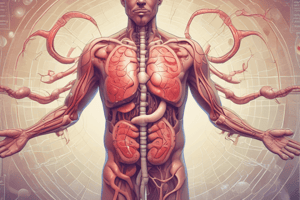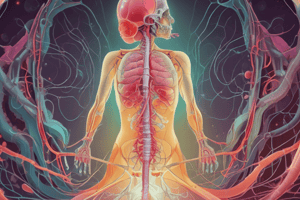Podcast
Questions and Answers
¿Cuál es el lugar donde se produce la filtración en el proceso de formación de orina?
¿Cuál es el lugar donde se produce la filtración en el proceso de formación de orina?
- Cápsula de Bowman (correct)
- Túbulo contornado distal (DCT)
- Glomérulo
- Túbulo contornado proximal (PCT)
¿Cuál es la capa de tejido adiposo que rodea el riñón?
¿Cuál es la capa de tejido adiposo que rodea el riñón?
- Fascia renal
- Capsula renal
- Capsula adiposa (correct)
- Partes del sistema urinario
¿Cuál es la función principal de la capsula renal?
¿Cuál es la función principal de la capsula renal?
- Secrea hormonas que regulan various funciones del cuerpo
- Filtra desechos y líquidos excesivos de la sangre
- Almacena orina
- Protege y soporta el riñón (correct)
¿Cuál es el proceso por el cual los riñones secretan desechos y sustancias excesivas en la orina?
¿Cuál es el proceso por el cual los riñones secretan desechos y sustancias excesivas en la orina?
¿Cuál es el órgano que almacena la orina?
¿Cuál es el órgano que almacena la orina?
Flashcards are hidden until you start studying
Study Notes
Urine Formation
Overview
- Urine formation, also known as urine production, is the process by which the kidneys filter waste and excess substances from the blood and excrete them in the urine.
- The process involves three main steps: filtration, reabsorption, and secretion.
Step 1: Filtration
- Occurs in the renal corpuscle (Bowman's capsule) where blood pressure forces water, ions, and small molecules out of the blood and into the kidney.
- The glomerular filtration rate (GFR) is the rate at which the kidneys filter the blood.
- The filtrate contains water, ions, glucose, amino acids, and waste products.
Step 2: Reabsorption
- Occurs in the proximal convoluted tubule (PCT) where necessary substances are reabsorbed back into the bloodstream.
- Reabsorption of:
- Water (regulated by ADH/vasopressin)
- Glucose
- Amino acids
- Electrolytes (Na+, K+, Cl-, etc.)
- Other essential nutrients
Step 3: Secretion
- Occurs in the distal convoluted tubule (DCT) and collecting duct where remaining waste products are secreted into the urine.
- Secretion of:
- Waste products (urea, creatinine, bilirubin, etc.)
- Excess hydrogen ions (regulated by aldosterone)
- Potassium ions (regulated by aldosterone)
Regulation of Urine Formation
- Regulated by the hypothalamus, which monitors blood osmolarity and blood volume.
- The kidneys respond to changes in blood pressure, blood volume, and electrolyte balance to regulate urine formation.
Clinical Significance
- Disorders of urine formation can lead to diseases such as acute kidney injury (AKI) and chronic kidney disease (CKD).
- Understanding the process of urine formation is crucial for diagnosing and treating kidney-related disorders.
Studying That Suits You
Use AI to generate personalized quizzes and flashcards to suit your learning preferences.




